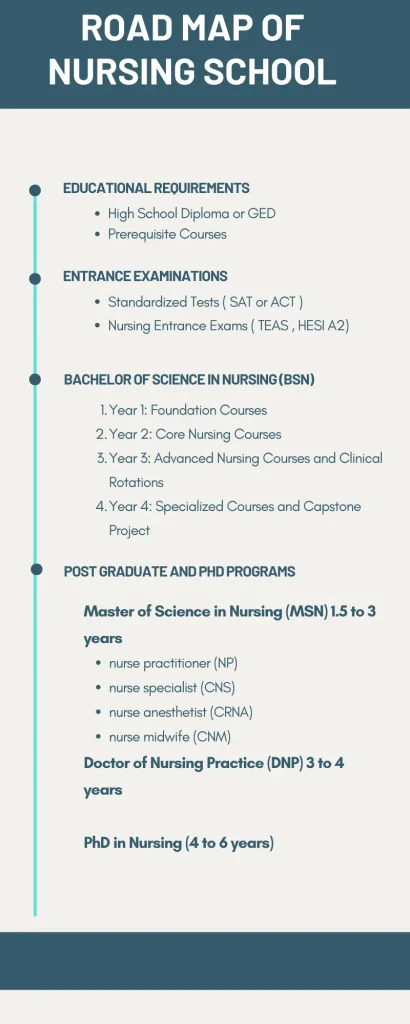How Long is Nursing School
“How Long is Nursing School” is a common question for prospective students eager to join the healthcare field. Nursing school duration varies based on the chosen program and career goals. In this article, we’ll explore the length of nursing school, and medical school, the structure of its programs, and the requirements for entry.
What is Nursing School
Nursing school is an educational institution that prepares students for a career in nursing. These schools offer various programs, including diplomas, associate degrees, and bachelor’s degrees in nursing. The curriculum combines theoretical knowledge with practical clinical experience, enabling students to provide comprehensive patient care. There are different types of nurses Nurse Practitioners, LPNs, and Registered Nurses.

Nursing school equips students with the skills necessary for diverse healthcare settings. Courses cover subjects such as anatomy, physiology, pharmacology, and patient care techniques. Additionally, students gain hands-on experience through clinical rotations in hospitals and healthcare facilities.
How Long is Nursing School
The duration of nursing school depends on the type of degree pursued. Let’s examine the time commitment for an undergraduate program, specifically the Bachelor of Science in Nursing (BSN).
Year 1: Foundation Courses
The first year of a BSN program focuses on foundational courses. Students typically take classes in general education subjects like English, mathematics, and basic sciences. Introduction to nursing courses begins, providing an overview of the nursing profession, medical terminology, and basic patient care skills.
Year 2: Core Nursing Courses
In the second year, students delve deeper into nursing-specific courses. Subjects include anatomy and physiology, microbiology, pharmacology, and pathophysiology. These courses build a strong foundation in the biological and physical sciences critical for nursing practice.
Year 3: Advanced Nursing Courses and Clinical Rotations
The third year is more intensive, with advanced nursing courses and clinical rotations. Students study medical-surgical nursing, pediatric nursing, psychiatric nursing, and maternal-child nursing. Clinical rotations in various healthcare settings allow students to apply theoretical knowledge in real-world scenarios, developing critical thinking and practical skills.
Year 4: Specialized Courses and Capstone Project
In the final year, students take specialized courses in areas such as community health nursing, leadership, and management. A significant component of the fourth year is the capstone project or practicum, where students demonstrate their competence through a comprehensive project or extended clinical practice.

How to Enter Nursing School
Entering nursing school requires meeting specific educational and testing requirements. Here’s a breakdown of what prospective students need to do:
Educational Requirements
High School Diploma or GED: Applicants must have a high school diploma or equivalent.
Prerequisite Courses: Many nursing programs require completion of prerequisite courses such as biology, chemistry, and mathematics. These courses ensure students have a strong foundation in the sciences.
Entrance Examinations
Standardized Tests: Some nursing schools require standardized test scores, such as the SAT or ACT. These scores help evaluate a student’s readiness for college-level coursework.
Nursing Entrance Exams: Many programs require nursing entrance exams like the Test of Essential Academic Skills (TEAS) or the Health Education Systems, Inc. Admission Assessment (HESI A2). These exams assess a candidate’s academic skills and suitability for nursing education.
Additional Requirements
- Application Form: Complete the application form provided by the nursing school.
- Transcripts: Submit official transcripts from high school and any post-secondary institutions attended.
- Letters of Recommendation: Provide letters of recommendation from teachers, employers, or healthcare professionals.
- Personal Statement: Write a personal statement or essay explaining your interest in nursing and career goals.
- Interview: Some programs require an interview as part of the admission process.
Post Graduate and PhD Programs
Nursing education extends beyond undergraduate degrees, offering various postgraduate and PhD programs for those seeking advanced specialization and leadership roles.
Master of Science in Nursing (MSN)
An MSN program allows nurses to specialize in areas such as nurse practitioner (NP), clinical nurse specialist (CNS), nurse anesthetist (CRNA), or nurse midwife (CNM). Typically, MSN programs take 1.5 to 3 years to complete and include both advanced clinical training and coursework in healthcare management, policy, and research.
Doctor of Nursing Practice (DNP)
The DNP is a practice-focused doctoral program designed to prepare nurses for the highest level of clinical practice. DNP programs emphasize evidence-based practice, quality improvement, and systems leadership. These programs usually take 3 to 4 years to complete post-MSN.
PhD in Nursing
A PhD in Nursing is a research-focused doctoral program that prepares nurses for careers in academia, research, and leadership in healthcare policy. PhD programs typically take 4 to 6 years to complete and involve extensive research training, culminating in a dissertation.
Top 10 Nursing Schools
Here is a list of the top 10 nursing schools in the world, renowned for their comprehensive programs and advanced facilities:

University of Pennsylvania School of Nursing (USA)
Offers BSN, MSN, DNP, and PhD programs with specializations in nurse anesthesia, pediatric nursing, and family nurse practitioner.
Johns Hopkins University School of Nursing (USA)
Provides BSN, MSN, DNP, and PhD programs with specialties in public health nursing, gerontology, and clinical nurse leadership.
University of Washington School of Nursing (USA)
Offers BSN, ABSN, MSN, DNP, and PhD programs, focusing on healthcare innovation, community health, and mental health nursing.
King’s College London, Florence Nightingale Faculty of Nursing and Midwifery (UK)
Provides BSc, MSc, and PhD programs with specialties in midwifery, global health, and critical care nursing.
University of California, San Francisco School of Nursing (USA)
Offers MS, DNP, and PhD programs with focuses on health policy, oncology nursing, and nurse-midwifery.
University of Toronto Lawrence S. Bloomberg Faculty of Nursing (Canada)
Provides BScN, MN, and PhD programs, specializing in primary healthcare, nursing informatics, and gerontological nursing.
University of Melbourne School of Health Sciences (Australia)
Offers BSN, MSN, and PhD programs with a focus on acute care, mental health, and rural nursing.
Yale School of Nursing (USA)
Provides GEPN (Graduate Entry Prespecialty in Nursing), MSN, DNP, and PhD programs with specializations in family nurse practitioner and nurse-midwifery.
University of Manchester Faculty of Biology, Medicine and Health (UK)
Offers BNurs, MNurs, and PhD programs with focuses on mental health nursing, adult nursing, and healthcare management.
Columbia University School of Nursing (USA)
Provides BSN, MS, DNP, and PhD programs with specialties in nurse anesthesia, psychiatric-mental health, and pediatric primary care, health, and pediatric primary care.
Factors Affecting the Length of Nursing School
Several factors can influence the duration of nursing education:
Type of Degree: Diploma, ADN, BSN, MSN, DNP, and PhD programs have varying lengths.
Full-time vs. Part-time Enrollment: Full-time students complete programs faster than part-time students.
Prerequisite Coursework: Completing required prerequisites can add time before starting core nursing courses.
Program Format: Traditional, accelerated, and online programs have different time commitments.
Clinical Rotations: The length and complexity of required clinical rotations can vary.
Transfer Credits: Credits from previous education can reduce the time needed to complete a program.
Institutional Requirements: Different schools have unique curriculum structures and requirements.
Final Verdict
Answer to the question How Long is Nursing School Choosing to pursue a career in nursing involves careful consideration of educational pathways and time commitments. Nursing school can range from a few years for an associate degree to several years for advanced practice and doctoral degrees. Understanding the various programs and requirements can help prospective students make informed decisions about their nursing careers.
FAQs
How long does it take to become a registered nurse (RN)?
It typically takes 2 to 4 years to become an RN, depending on whether you pursue an associate degree (2 years) or a bachelor’s degree (4 years).
Can I work while attending nursing school?
Yes, many students work part-time while attending nursing school, though balancing work and studies can be challenging. Some programs offer flexible schedules to accommodate working students.
What are the prerequisites for nursing school?
Prerequisites often include courses in biology, chemistry, anatomy, physiology, and sometimes math and English.
Are there online nursing programs?
Yes, many institutions offer online nursing programs, especially for theoretical coursework. Clinical rotations, however, must be completed in person.
What is the difference between a BSN and an ADN?
A BSN (Bachelor of Science in Nursing) is a four-year degree that provides comprehensive nursing education, while an ADN (Associate Degree in Nursing) is a two-year degree focusing on basic nursing skills. A BSN may offer more opportunities for advancement and specialization.
